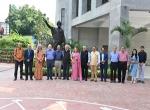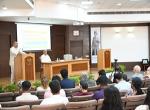The focus of VIF’s Vimarsha (a series in monthly talks on subjects of national importance with contemporary relevance) for the month of March 2012 was ‘Functioning of Parliamentary Democracy in India’, a subject which has agitated minds of a large section of the people in our country in recent times. The talk by Mr. Purno A. Sangma, a veteran politician from India’s northeast and an erstwhile Speaker of the Eleventh Lok Sabha was attended by a group of well-informed citizenry which comprised, among others, members of academia, former high-ranking civil-military officials, and media personnel. The evening session was chaired by Mr. Ajit Doval KC, Director VIF with Mr. A Suryaprakash, a noted journalist, and also a Senior Fellow at the foundation sharing the platform. Dr. Subhash C. Kashyap, well-known constitution expert and the former Secretary-General of Lok Sabha, Mr. AK Verma, Ex-Chief RAW, Mr. Ved Prakash Marwah, former Governor of Manipur, Mizoram and Jharkhand, and Mr. Vijai Kapoor, former Lieutenant Governor Delhi were among few important luminaries who attended Mr. Sangma’s talk at the VIF.
Mr. Doval’s incisive remarks, parts of his welcome speech, set the tone for the evening’s discussion. The quality of a nation is largely determined by the type of discourses which usually take place in that nation, Mr. Doval said. He remarked rather ruefully that some of the recent discourses in the public domains of India were often a poignant reminder to the crumbling of India’s vital institutions. The erosion of people’s faith in these institutions, especially the Parliament, does not bode well for the future of our country. He also felt strongly that it was imperative to restore the people’s faith in the Parliament of India or else our significant achievements as a vibrant democracy would be lost.

Known for his genial persona and a smile that never deserts him, Mr. Purno A. Sangma was clearly visibly perturbed at the growing political instability in India. A Member of Parliament for nine times, Mr. Sangma first entered the Lok Sabha in 1977 when the rule of a single party ended. Ideally, Mr. Sangma should have contested five general elections during the phase from 1977 to the present. Instead he had faced nine general elections.
Mr. Sangma felt that the higher frequency of general elections in India, besides being a burden on the exchequer, was a worrying trend for India’s democracy. He also supported the proposals for the Right to recall and the Right to reject as being necessary for the sustenance of parliamentary democracy in India. It is unfortunate that parliamentarians resort to disturbing the proceedings in the Parliament often to address their own narrow constituencies. Unlike in the past when the financing and functioning of all the important ministries were discussed in the Budget Session of the Parliament, a new trend has emerged over the past ten-fifteen years. The federal budgets of India are being passed by the Parliament without any ministry being discussed at all.
Mr. Sangma expressed serious concern that the biggest challenge facing India today is the crisis of national leadership. Even worse, the elected members of Lok Sabha can’t even reach a consensus to choose a Prime Minister who is a member of the Lok Sabha. Failures in reaching a consensus among the elected representatives has often led to a situation where the Prime Minister had to be chosen either from the Rajya Sabha or from among the Chief Ministers of the states, a trend which began with Mr. Deve Gowda and continues to the present Prime Minister Dr. Manmohan Singh. A veteran parliamentarian, Mr. Sangma insisted that electing a Prime Minister from the Lower House of the Parliament remains one of the key responsibilities of the elected MPs.
In so far as the current state of political instability in India is concerned, Mr. Sangma went on to suggest the idea of a national government with both Congress and the BJP sharing power for the sake of stability. Although Mr. Sangma did not support the idea of Presidential form of government, he said that direct election of the Prime Minister could be a better option. Not happy with No Confidence Motions which could create further instability, Mr. Sangma suggested the German model of a No Confidence Motion which is always backed the naming of an alternative candidate for the post of Chancellor. He remained equally upset with the growing levels of corruption, particularly at high places. While he favoured the idea of an anti-corruption watchdog Lokpal, he said that the Prime Minister should be kept out of its purview. However, corruption needed to be tackled with a firm hand as it was destroying the vitals of our system.
That Mr. Sangma’s talk generated lively interest among the audience was clear from the barrage of questions thrown at him. He answered all the questions with his usual calm and deftness. The Vote of Thanks was proposed by Mr. A. Suryaprakash.
Report prepared by Sanjay Kumar
For the Full Text of Speech click here






